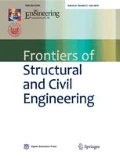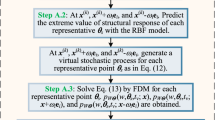Abstract
The safety evaluation of engineering systems whose performance evaluation requires finite element analysis is a challenge in reliability theory. Recently, Adjusted Control Variates Technique (ACVAT) has proposed by the authors to solve this issue. ACVAT uses the results of a finite element method (FEM) model with coarse mesh density as the control variates of the model with fine mesh and efficiently solves FEM-based reliability problems. ACVAT however does not provide any results about the reliability-based mesh convergence of the problem, which is an important tool in FEM. Mesh-refinement analysis allows checking whether the numerical solution is sufficiently accurate, even though the exact solution is unknown. In this study, by introducing expanded control variates (ECV) formulation, ACVAT is improved and the capabilities of the method are also extended for efficient reliability mesh convergence analysis of FEM-based reliability problems. In the present study, the FEM-based reliability analyses of four practical engineering problems are investigated by this method and the corresponding results are compared with accurate results obtained by analytical solutions for two problems. The results confirm that the proposed approach not only handles the mesh refinement progress with the required accuracy, but it also reduces considerably the computational cost of FEM-based reliability problems.
Similar content being viewed by others
References
Nowak A S, Collins K R. Reliability of Structures. New York: McGraw-Hill, 2000
Gallimard L. Error bounds for the reliability index in finite element reliability analysis. International Journal for Numerical Methods in Engineering, 2011, 87(8): 781–794
Ghavidel A, Rashki M, Mousavi S R. The effect of FEM mesh density on the failure probability analysis of structures. KSCE Journal of Civil Engineering, 2018, 22(7): 2371–2383
Rashki M, Ghavidel A, Ghohani Arab H, Mousavi S R. Low-cost finite element method-based reliability analysis using adjusted control variate technique. Structural Safety, 2018, 75: 133–142
Javed A, Djijdeli K, Xing J T. A coupled meshfree-mesh-based solution scheme on hybrid grid for flow-induced vibrations. Acta Mechanica, 2016, 227(8): 2245–2274
Li Z, Wood R. Accuracy verification of a 2D adaptive mesh refinement method for incompressible or steady flow. Journal of Computational and Applied Mathematics, 2017, 318: 259–265
Morgan N R, Waltz J I. 3D level set methods for evolving fronts on tetrahedral meshes with adaptive mesh refinement. Journal of Computational Physics, 2017, 336: 492–512
Anitescu C, Hossain M N, Rabczuk T. Recovery-based error estimation and adaptivity using high-order splines over hierarchical T-meshes. Computer Methods in Applied Mechanics and Engineering, 2018, 328: 638–662
Hennig P, Kästner M, Morgenstern P, Peterseim D. Adaptive mesh refinement strategies in isogeometric analysis—A computational comparison. Computer Methods in Applied Mechanics and Engineering, 2017, 316: 424–448
Ray N, Grindeanu I, Zhao X, Mahadevan V, Jiao X. Array-based, parallel hierarchical mesh refinement algorithms for unstructured meshes. Computer Aided Design, 2017, 85: 68–82
Bespalov A, Haberl A, Praetorius D. Adaptive FEM with coarse initial mesh guarantees optimal convergence rates for compactly perturbed elliptic problems. Computer Methods in Applied Mechanics and Engineering, 2017, 317: 318–340
Rabczuk T, Ren H, Zhuang X. A nonlocal operator method for partial differential equations with application to electromagnetic waveguide problem. Computers, Materials & Continua, 2019, 59(1): 31–55
Anitescu C, Atroshchenko E, Alajlan N, Rabczuk T. Artificial neural network methods for the solution of second order boundary value problems. Computers, Materials & Continua, 2019, 59(1): 345–359
Guo H, Zhuang X, Rabczuk T. A deep collocation method for the bending analysis of Kirchhoff plate. Computers, Materials & Continua, 2019, 59(2): 433–456
Weiber S. Residual based error estimate and quasi-interpolation on polygonal meshes for high order BEM-based FEM. Computers & Mathematics with Applications (Oxford, England), 2017, 73(2): 187–202
Wu J, Zheng H. Uniform convergence of multigrid methods for adaptive meshes. Applied Numerical Mathematics, 2017, 113: 109–123
Liu G R. The smoothed finite element method (S-FEM): A framework for the design of numerical models for desired solutions. Frontiers of Structural and Civil Engineering, 2019, 13(2): 456–477
Brambilla P, Brivio P, Guardone A, Romanelli G. Grid convergence assessment for adaptive grid simulations of normal drop impacts onto liquid films in axi-symmetric and three-dimensional geometries. Applied Mathematics and Computation, 2015, 267: 487–497
Lockard D P. In search of grid converged solutions. Procedia Engineering, 2010, 6: 224–233
Płaszewski P, Banaś K. Performance analysis of iterative solvers of linear equations for Hp-adaptive finite element method. Procedia Computer Science, 2013, 18: 1584–1593
Jones A C, Wilcox R K. Finite element analysis of the spine: Towards a framework of verification, validation and sensitivity analysis. Medical Engineering & Physics, 2008, 30(10): 1287–1304
Hamdia K M, Ghasemi H, Zhuang X, Alajlan N, Rabczuk T. Sensitivity and uncertainty analysis for flexoelectric nanostructures. Computer Methods in Applied Mechanics and Engineering, 2018, 337: 95–109
Liu P L, Liu K G. Selection of random field mesh in finite element reliability analysis. Journal of Engineering Mechanics, 1993, 119(4): 667–680
Manjuprasad M, Manohar C S. Adaptive random field mesh refinements in stochastic finite element reliability analysis of structures. Computer Modeling in Engineering & Sciences, 2007, 19(1): 23–54
Tracey B, Wolper D. Reducing the error of Monte Carlo algorithms by learning control variates. In: The 29th Conference on Neural Information Processing Systems (NIPS). Barcelona, 2016
Rashki M, Miri M, Azhdary Moghaddam M. A new efficient simulation method to approximate the probability of failure and most probable point. Structural Safety, 2012, 39: 22–29
Arab H G, Rashki M, Rostamian M, Ghavidel A, Shahraki H. Refined first-order reliability method using cross-entropy optimization method. Engineering with Computers, 2018, 35: 1–13
Green D K E. Efficient Markov Chain Monte Carlo for combined subset simulation and nonlinear finite element analysis. Computer Methods in Applied Mechanics and Engineering, 2017, 313: 337–361
Megson T H G. Structural and Stress Analysis. 2nd ed. Amsterdam/London: Elsevier Butterworth-Heinemann, 2005
Clough R W, Penzien J. Dynamics of Structures. 2nd ed. New York: McGraw-Hill, 1993
Tada H, Paris P C, Irwin G R. The Stress Analysis of Cracks Handbook. New York: ASME press, 2000
Bower A F. Applied Mechanics of Solids. Boca Raton: CRC Press, Taylor & Francis, 2009
Author information
Authors and Affiliations
Corresponding author
Rights and permissions
About this article
Cite this article
Ghavidel, A., Rashki, M., Ghohani Arab, H. et al. Reliability mesh convergence analysis by introducing expanded control variates. Front. Struct. Civ. Eng. 14, 1012–1023 (2020). https://doi.org/10.1007/s11709-020-0631-6
Received:
Accepted:
Published:
Issue Date:
DOI: https://doi.org/10.1007/s11709-020-0631-6



